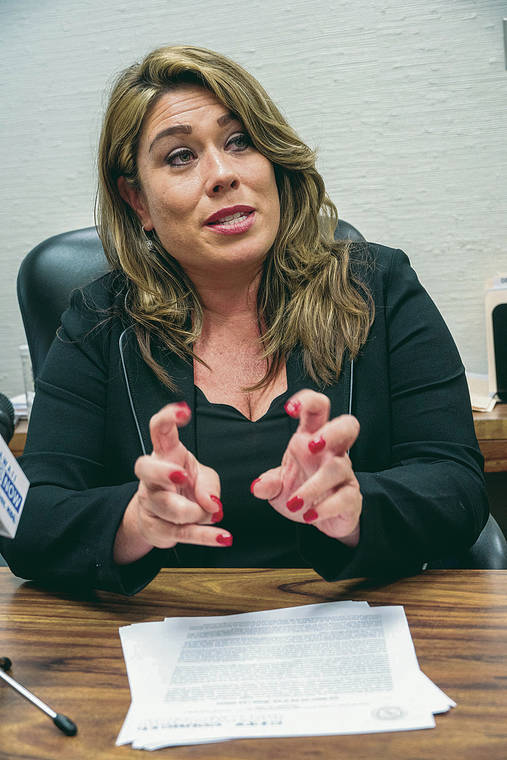A Honolulu City Council committee on Wednesday held off action on a resolution sought by Kahuku residents that presses the Department of Planning and Permitting to more tightly regulate a wind farm project going up next to area schools.
Na Pua Makani Power Partners is putting up a 24-megawatt wind farm consisting of eight wind turbine generators and obtained three minor conditional use permits from DPP to do so.
Project opponents say building permits were pulled by the developer
after deadlines imposed
by the conditional use
permits, that the work is
beyond the scope of allowable noise levels and
proximity of windmills to schools or farms, and that DPP has failed to act against these violations.
“It’s too close … and no one’s listening to us,” said Kahuku resident Joshua
Kaina, who supports the resolution. Kaina said he has developed tinnitus and other health problems since he moved back recently to Kahuku where another company already has eight turbines up.
Tatiana Santiago said one of the turbines will be placed in the back of her family’s yard. “I am concerned that if something happens to this thing, and it comes down and falls on our home, we are literally right along the line of this turbine,” she said.
Mark Miller, chief operating officer for AES United States, parent company of the Na Pua Makani project, said its permit approvals spelled out broad guidelines to follow. Adjustments made to the original plan were neither substantial enough to report nor in violation of any conditions of its permits, he said.
The company has tried to address the issues raised, and has assured the community that “subsequent to operation, that if there are concerns that we are not complying, then it is our obligation to address those,” Miller said.
Acting DPP Director Kathy Sokugawa said Na Pua Makani requested and received time extensions for obtaining the building permits.
As for the allegations that the project had been significantly altered from what was described in the original conditional use permits, Sokugawa said DPP is not required to check for compliance during the building permit stage.
“If there’s a significant departure from what we approved in the conditional use permit, we can look at that,” but neither the developer nor the community has approached DPP about any changes, she said.
Councilwoman Heidi Tsuneyoshi, who represents the North Shore, urged members of the Council Zoning, Planning and Housing Committee to give its OK to Resolution 19-241 Opens in a new tab, which she introduced. The resolution urges DPP to “strictly enforce compliance with all applicable conditions and laws pertaining to permits and approvals” for the
project.
But Zoning Chairman Ron Menor said too much new information had been unveiled and that the resolution needed to be “taken under advisement” to allow him and his colleagues time to study the community concerns with the city’s need to promote renewable energy.
Tsuneyoshi, who was visibly upset by Menor’s recommendation, said he would not be holding up the resolution if the project was going up next to schools in Mililani or Waipahu, districts he represents.

